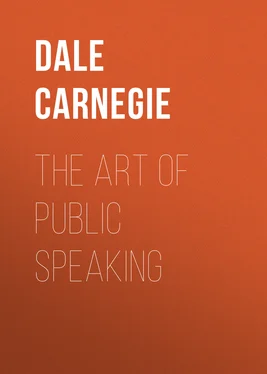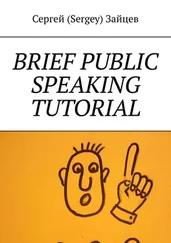Illustrations without number might be cited to show that in all our actions we are emotional beings. The speaker who would speak efficiently must develop the power to arouse feeling.
Webster, great debater that he was, knew that the real secret of a speaker's power was an emotional one. He eloquently says of eloquence:
"Affected passion, intense expression, the pomp of declamation, all may aspire after it; they cannot reach it. It comes, if it come at all, like the outbreak of a fountain from the earth, or the bursting forth of volcanic fires, with spontaneous, original, native force.
"The graces taught in the schools, the costly ornaments and studied contrivances of speech, shock and disgust men, when their own lives, and the fate of their wives, their children, and their country hang on the decision of the hour. Then words have lost their power, rhetoric is in vain, and all elaborate oratory contemptible. Even genius itself then feels rebuked and subdued, as in the presence of higher qualities. Then patriotism is eloquent, then self-devotion is eloquent. The clear conception outrunning the deductions of logic, the high purpose, the firm resolve, the dauntless spirit, speaking on the tongue, beaming from the eye, informing every feature, and urging the whole man onward, right onward to his subject—this, this is eloquence; or rather, it is something greater and higher than all eloquence; it is action, noble, sublime, godlike action."
When traveling through the Northwest some time ago, one of the present writers strolled up a village street after dinner and noticed a crowd listening to a "faker" speaking on a corner from a goods-box. Remembering Emerson's advice about learning something from every man we meet, the observer stopped to listen to this speaker's appeal. He was selling a hair tonic, which he claimed to have discovered in Arizona. He removed his hat to show what this remedy had done for him, washed his face in it to demonstrate that it was as harmless as water, and enlarged on its merits in such an enthusiastic manner that the half-dollars poured in on him in a silver flood. When he had supplied the audience with hair tonic, he asked why a greater proportion of men than women were bald. No one knew. He explained that it was because women wore thinner-soled shoes, and so made a good electrical connection with mother earth, while men wore thick, dry-soled shoes that did not transmit the earth's electricity to the body. Men's hair, not having a proper amount of electrical food, died and fell out. Of course he had a remedy—a little copper plate that should be nailed on the bottom of the shoe. He pictured in enthusiastic and vivid terms the desirability of escaping baldness—and paid tributes to his copper plates. Strange as it may seem when the story is told in cold print, the speaker's enthusiasm had swept his audience with him, and they crushed around his stand with outstretched "quarters" in their anxiety to be the possessors of these magical plates!
Emerson's suggestion had been well taken—the observer had seen again the wonderful, persuasive power of enthusiasm!
Enthusiasm sent millions crusading into the Holy Land to redeem it from the Saracens. Enthusiasm plunged Europe into a thirty years' war over religion. Enthusiasm sent three small ships plying the unknown sea to the shores of a new world. When Napoleon's army were worn out and discouraged in their ascent of the Alps, the Little Corporal stopped them and ordered the bands to play the Marseillaise. Under its soul-stirring strains there were no Alps.
Listen! Emerson said: "Nothing great was ever achieved without enthusiasm." Carlyle declared that "Every great movement in the annals of history has been the triumph of enthusiasm." It is as contagious as measles. Eloquence is half inspiration. Sweep your audience with you in a pulsation of enthusiasm. Let yourself go. "A man," said Oliver Cromwell, "never rises so high as when he knows not whither he is going."
How are We to Acquire and Develop Enthusiasm?
It is not to be slipped on like a smoking jacket. A book cannot furnish you with it. It is a growth—an effect. But an effect of what? Let us see.
Emerson wrote: "A painter told me that nobody could draw a tree without in some sort becoming a tree; or draw a child by studying the outlines of his form merely,—but, by watching for a time his motion and plays, the painter enters his nature, and then can draw him at will in every attitude. So Roos 'entered into the inmost nature of his sheep.' I knew a draughtsman employed in a public survey, who found that he could not sketch the rocks until their geological structure was first explained to him."
When Sarah Bernhardt plays a difficult role she frequently will speak to no one from four o'clock in the afternoon until after the performance. From the hour of four she lives her character. Booth, it is reported, would not permit anyone to speak to him between the acts of his Shakesperean rôles, for he was Macbeth then—not Booth. Dante, exiled from his beloved Florence, condemned to death, lived in caves, half starved; then Dante wrote out his heart in "The Divine Comedy." Bunyan entered into the spirit of his "Pilgrim's Progress" so thoroughly that he fell down on the floor of Bedford jail and wept for joy. Turner, who lived in a garret, arose before daybreak and walked over the hills nine miles to see the sun rise on the ocean, that he might catch the spirit of its wonderful beauty. Wendell Phillips' sentences were full of "silent lightning" because he bore in his heart the sorrow of five million slaves.
There is only one way to get feeling into your speaking—and whatever else you forget, forget not this: You must actually ENTER INTO the character you impersonate, the cause you advocate, the case you argue—enter into it so deeply that it clothes you, enthralls you, possesses you wholly. Then you are, in the true meaning of the word, in sympathy with your subject, for its feeling is your feeling, you "feel with" it, and therefore your enthusiasm is both genuine and contagious. The Carpenter who spoke as "never man spake" uttered words born out of a passion of love for humanity—he had entered into humanity, and thus became Man.
But we must not look upon the foregoing words as a facile prescription for decocting a feeling which may then be ladled out to a complacent audience in quantities to suit the need of the moment. Genuine feeling in a speech is bone and blood of the speech itself and not something that may be added to it or substracted at will. In the ideal address theme, speaker and audience become one, fused by the emotion and thought of the hour.
The Need of Sympathy for Humanity
It is impossible to lay too much stress on the necessity for the speaker's having a broad and deep tenderness for human nature. One of Victor Hugo's biographers attributes his power as an orator and writer to his wide sympathies and profound religious feelings. Recently we heard the editor of Collier's Weekly speak on short-story writing, and he so often emphasized the necessity for this broad love for humanity, this truly religious feeling, that he apologized twice for delivering a sermon. Few if any of the immortal speeches were ever delivered for a selfish or a narrow cause—they were born out of a passionate desire to help humanity; instances, Paul's address to the Athenians on Mars Hill, Lincoln's Gettysburg speech, The Sermon on the Mount, Henry's address before the Virginia Convention of Delegates.
The seal and sign of greatness is a desire to serve others. Self-preservation is the first law of life, but self-abnegation is the first law of greatness—and of art. Selfishness is the fundamental cause of all sin, it is the thing that all great religions, all worthy philosophies, have struck at. Out of a heart of real sympathy and love come the speeches that move humanity.
Читать дальше












